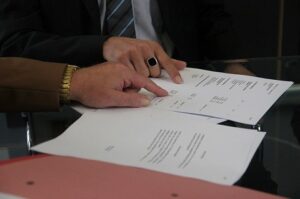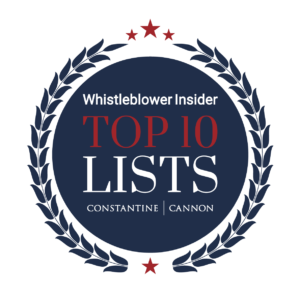Top Ten Non-Healthcare False Claims Act Recoveries for 2023

It was another big year for DOJ enforcement under the False Claims Act, the government’s primary fraud-fighting tool. As usual, most of the recoveries were in the healthcare space with seven of the Top Ten recoveries involving various schemes to defraud Medicare and Medicaid. See our Top Ten FCA and Top Ten Healthcare FCA listings.
While healthcare recoveries dominated the Top Ten, two of the top five recoveries involved government contracting fraud. Historically, that is the most common area of fraud enforcement after healthcare fraud. It is also what prompted the enactment of the statute in the first place more than 160 years ago — to go after war profiteers trying to dupe the Union Army during the Civil War with lame mules and munitions made of sawdust.
Looking at the Top Ten listing of non-healthcare False Claims Act recoveries this past year in total, most of them involved fraud under various government contracting programs, including military supply, telecommunications, mortgage origination and underwriting, education, leasing of federal lands, customs, disaster relief, and COVID relief.
Unsurprisingly, all but two of the Top Ten recoveries stemmed from actions filed by whistleblowers under the qui tam provisions of the False Claims Act which authorize whistleblowers to sue on behalf of the government those committing fraud against the government. Over the past several decades, the government has recovered tens of billions of dollars under the False Claims Act, with the vast majority of those recoveries originated by whistleblowers.
As in past years, Constantine Cannon is represented on the Top Ten list with its representation of the whistleblowers in the KBR matter, taking the number two spot below.
Here is our listing of the Top Ten non-healthcare False Claims Act recoveries for 2023, which alone totaled more than $600 million.
1 — Booz Allen ($377M). The Virginia-based consulting and engineering contractor agreed to pay roughly $377 million to settle charges it violated the False Claims Act by improperly billing the government for costs that should have been billed to its commercial and international contracts. The allegations originated in a whistleblower lawsuit filed by former Booz Allen employee Sarah Feinberg.
2 – KBR ($109M). The Texas-based government contractor agreed to pay roughly $109 million to settle charges it violated the False Claims Act in its US Army supply contract in Iraq by
routinely ordering new materials when excess quantities of the same items were sitting in KBR warehouses in Iraq. The allegations originated in a whistleblower lawsuit filed by former KBR employees Geoffrey Howard and Zella Hemphill Anderson. The government did not join this lawsuit, leaving the whistleblower to pursue the action on its own as it is entitled to do under the statute.
3 – GCI Communications ($40M). The Alaska-based telecommunications provider agreed to pay roughly $40 million to settle charges it violated the False Claims Act by inflating its prices and violating Federal Communications Commission (FCC) competitive bidding regulations in connection with the company’s participation in the FCC’s Rural Health Care Program. The program is designed to assist rural health care providers with their telecommunications needs. The allegations originated in a whistleblower lawsuit filed by the company’s former Director of Business Administration Robert Taylor.
4 — Movement Mortgage ($24M). The South Carolina-based mortgage company agreed to pay $23.75 million to settle charges it violated the False Claims Act by failing to comply with the origination and underwriting requirements for mortgages insured by HUD or guaranteed by the VA. According to the government, the company violated the rules that require lenders to maintain quality control programs, report any materially deficient loans, and ensure the underwriting process is free from conflicts of interest. The allegations originated in a whistleblower lawsuit filed by two former employees of the company.
5 — International Vitamins ($23M). The US-based company that imports and sells vitamins and nutritional supplements from China agreed to pay roughly $23 million to settle charges it violated the False Claims Act by misclassifying more than 30 of its products under the Harmonized Tariff Schedule to avoid paying customs duties and by failing to pay back duties. The allegations originated in a whistleblower lawsuit.
6 — XTO ($16M). XTO Energy agreed to pay $16 million to settle charges it violated the False Claims Act by underpaying royalties it owed on natural gas produced from federal and Native American lands. According to the government, XTO improperly deducted certain costs and failed to pay royalties on carbon dioxide.
7 — AECOM ($12M). The Dallas-based architecture and engineering firm agreed to pay $11.8 million to settle charges it violated the False Claims Act by improperly billing the Federal Emergency Management Agency (FEMA) for disaster assistance funds for several educational facilities in New Orleans damaged by Hurricane Katrina. The allegations originated in a whistleblower lawsuit filed by Robert Romero.
8 — Victory Automotive ($9M). The Florida-based automotive management company agreed to pay $9 million to settle charges it violated the False Claims Act by providing false information in support of a Paycheck Protection Program (PPP) loan forgiveness application. According to the government, the company certified it was a small business with fewer than 500 employees when in fact the company and its affiliates had more than 3,000 employees. This made the company ineligible for the $6.3 million loan it received under the program, which was later forgiven in full. The allegations originated in a whistleblower lawsuit.
9 — Career Institute ($9M). Texas-based ELPSS Career and its director, Ricky J. Daniels, Jr., were ordered by a Texas federal court to pay just over $9 million in damages and civil penalties for violating the False Claims Act by defrauding the Post-9/11 GI Bill. Under the Bill, non-accredited career schools must operate for at least two years before enrolling students receiving Post-9/11 GI Bill benefits. According to the government, the school falsely certified complying with this requirement when in fact it was open less than a year.
10 — Boeing ($8M). The Virginia-based aircraft maker agreed to pay roughly $8 million to settle charges it violated the False Claims Act by improperly billing the US Navy on its contracts to manufacture the V-22 Osprey military aircraft. According to the government, Boeing failed to comply with certain regular testing requirements of the contracts. The allegations originated in a whistleblower lawsuit filed by former Boeing employees who worked in the V-22 program.
If you have information relating to potential fraud against the government and would like to speak to an experienced member of the Constantine Cannon whistleblower lawyer team, please don’t hesitate to contact us for a free and confidential consultation. Maybe you can make the Top Ten list in the years to come.

Annual Whistleblower Insider Top Ten Lists
Every January, Whistleblower Insider looks back at the significant government enforcement actions of the past year. Our Top Ten lists highlight the biggest recoveries and significant enforcement efforts by different government actors in cases of interest to whistleblowers.
Browse Top 10 Lists
Read More
- The False Claims Act
- Government Contract Fraud
- Fraud in Government Programs
- Contact Us Confidentially
Tagged in: Customs Fraud, Education Fraud, FCA Federal, Government Procurement Fraud, Government Programs Fraud, Housing and Mortgage Fraud, Top 10,